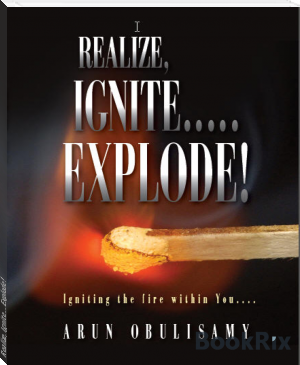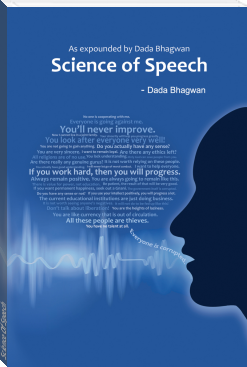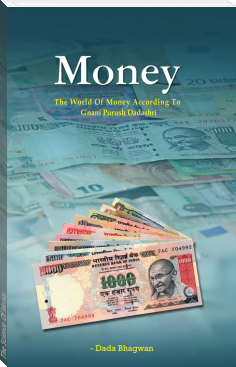An Introduction to Yoga - Annie Besant (best mobile ebook reader .txt) 📗

- Author: Annie Besant
Book online «An Introduction to Yoga - Annie Besant (best mobile ebook reader .txt) 📗». Author Annie Besant
same as with the "Sermon on the Mount" in Christian countries, but there the practical common sense of the people bows to it and--ignores it. No nation tries to live by the "Sermon on the Mount " It is not meant for ordinary men and women, but for the saint. For all those who are on the Path of Forthgoing, desire is necessary for progress.
What is the Path of Nivritti? It is the Path of Return. There desire must cease; and the Self-determined will must take its place. The last object of desire in a person commencing the Path of Return is the desire to work with the Will of the Supreme; he harmonises his will with the Supreme Will, renounces all separate desires, and thus works to turn the wheel of life as long as such turning is needed by the law of Life. Desire on the Path of Forthgoing becomes will on the Path of Return; the soul, in harmony with the Divine, works with the law. Thought on the Path of Forthgoing is ever alert, flighty and changing; it becomes reason on the Path of Return; the yoke of reason is placed on the neck of the lower mind, and reason guides the bull. Work, activity, on the Path of Forthgoing, is restless action by which the ordinary man is bound; on the Path of Return work becomes sacrifice, and thus its binding force is broken. These are, then, the manifestations of three aspects, as shown on the Paths of Forthgoing and Return.
Bliss manifested as desire is changed into will Wisdom manifested as thought is changed into reason. Activity manifested as work is changed into sacrifice.
People very often ask with regard to this: "Why is will placed in the human being as the correspondence of bliss in the Divine?" The three great Divine qualities are: chit or consciousness; ananda or bliss; sat or existence. Now it is quite clear that the consciousness is reflected in intelligence in man--the same quality, only in miniature. It is equally clear that existence and activity belong to each other. You can only exist as you act outwards. The very form of the word shows It --"ex, out of"; it is manifested life. That leaves the third, bliss, to correspond with will, and some people are rather puzzled with that, and they ask: "What is the correspondence between bliss and will?" But if you come down to desire, and the objects of desire, you will be able to solve the riddle. The nature of the Self is bliss. Throw that nature down into matter and what will be the expression of the bliss nature? Desire for happiness, the seeking after desirable objects, which it imagines will give it the happiness which is of its own essential nature, and which it is continually seeking to realise amid the obstacles of the world. Its nature being bliss, it seeks for happiness and that desire for happiness is to be transmuted into will. All these correspondences have a profound meaning if you will only look into them, and that universal "will-to-live" translates itself as the "desire for happiness" that you find in every man and woman, in every sentient creature. Has it ever struck you how surely you are justifying that analysis of your own nature by the way you accept happiness as your right, and resent misery, and ask what you have done to deserve it? You do not ask the same about happiness, which is the natural result of your own nature. The thing that has to be explained is not happiness but pain, the things that are against the nature of the Self that is bliss. And so, looking into this, we see how desire and will are both the determination to be happy. But the one is ignorant, drawn out by outer objects; the other is self-conscious, initiated and ruled from within. Desire is evoked and directed from outside; and when the same aspect rules from within, it is will. There is no difference in their nature. Hence desire on the Path of Forthgoing becomes will on the Path of Return.
When desire, thought and work are changed into will, reason and sacrifice, then the man is turning homewards, then he lives by renunciation.
When a man has really renounced, a strange change takes place. On the Path of Forthgoing, you must fight for everything you want to get; on the Path of Return, nature pours her treasures at your feet. When a man has ceased to desire them, then all treasures pour down upon him, for he has become a channel through which all good gifts flow to those around him. Seek the good, give up grasping, and then everything will be yours. Cease to ask that your own little water tank may be filled, and you will become a pipe, joined to the living source of all waters, the source which never runs dry, the waters which spring up unfailingly. Renunciation means the power of unceasing work for the good of all, work which cannot fail, because wrought by the Supreme Worker through His servant.
If you are engaged in any true work of charity, and your means are limited and the wealth does not flow into your hands, what does it mean? It means that you have not yet learnt the true renunciation. You are clinging to the visible, to the fruit of action, and so the wealth does not pour through your hands.
Purification of Bodies
The unfolding of powers belongs to the side of consciousness; purification of bodies belongs to the side of matter. You must purify each of your three working bodies--mental, astral and physical. Without that purification you had better leave yoga alone. First of all, how shall you purify the thought body? By right thinking. Then you must use imagination, your great creative tool, once more. Imagine things, and, imagining them, you will form your thought-body into the organisation that you desire. Imagine something strongly, as the painter imagines when he is going to paint. Visualise an object if you have the power of visualisation at all: if you have not, try to make it. It is an artistic faculty, of course, hut most people have it more or less. See how far you can reproduce perfectly a face you see daily. By such practice you will be strengthening your imagination, and by strengthening your imagination you will be making the great tool with which you have to practice in Yoga.
There is another use of the imagination which is very valuable. If you will imagine in your thought-body the presence of the qualities that you desire to have, and the absence of those which you desire not to have, you are half-way to having and not having them. Also, many of the troubles of your life might be weakened if you would imagine them on right lines before you have to go through them. Why do you wait helplessly until you meet them in the physical world. If you thought of your coming trouble in the morning, and thought of yourself as acting perfectly in the midst of it (you should never scruple to imagine yourself perfect), when the thing turned up in the day, it would have lost its power, and you would no longer feel the sting to the same extent. Now each of you must have in your life something that troubles you. Think of yourself as facing that trouble and not minding it, and when it comes, you will be what you have been thinking. You might get rid of half your troubles and your faults, if you would deal with them through your imagination.
As the thought body, becomes purified in this way, you must turn to the astral body. The astral body is purified by right desire. Desire nobly, and the astral body will evolve the organs of good desires instead of the organs of evil ones. The secret of all progress is to think and desire the highest, never dwelling on the fault, the weakness, the error, but always on the perfected power, and slowly in that way you will be able to build up perfection in yourself. Think and desire, then, in order to purify the thought body and the astral body.
And how shall you purify the physical body? You must regulate it in all its activities--in sleep, in food, in exercise, in everything. You cannot have a pure physical body with impure mental and astral bodies so that the work of imagination helps also in the purification of the physical. But you must also regulate the physical body in all its activities. Take for instance, food. The Indian says truly that every sort of food has a dominant quality in it, either rhythm, or activity, or inertia, and that all foods fall under one of these heads. Now the man who is to be a yogi must not touch any food which is on the way to decay. Those things belong to the tamasic foods--all foods, for instance, of the nature of game, of venison, all food which is showing signs of decay (all alcohol is a product of decay), are to be avoided. Flesh foods come under the quality of activity. All flesh foods are really stimulants. All forms in the animal kingdom are built up to express animal desires and animal activities. The yogi cannot afford to use these in a body meant for the higher processes of thought. Vitality, yes, they will give that; strength, which does not last, they will give that; a sudden spurs of energy, yes, meat will give that; but those are not the things which the yogi wants; so he puts aside all those foods as not available for the work he desires, and chooses his food out of the most highly vitalised products. All the foods which tend to growth, those are the most highly vitalised, grain, out of which the new plant will grow, is packed full of the most nutritious substances; fruits; all those things which have growth as their next stage in the life cycle, those are the rhythmic foods, full of life, and building up a body sensitive and strong at the same time.
Dwellers on the Threshold
Of these there are many kinds. First, elementals. They try to bar the astral plane against man. And naturally so, because they are concerned with the building up of the lower kingdoms, these elementals of form, the Rupa Devas; and to them man is a really hateful creature, because of his destructive properties. That is why they dislike him so much. He spoils their work wherever he goes, tramples down vegetable things, and kills animals, so that the whole of that great kingdom of nature hates the name of man. They band themselves together to stop the one who is just taking his first conscious steps on the astral plane, and try to frighten him, for they fear that he is bringing destructiveness into the new world. They cannot do anything, if you do not mind them. When that rush of elemental force comes against the man entering on the astral plane, he must remain quiet, indifferent, taking up the position: "I am a higher product of evolution than you are; you can do nothing to me. I am your friend, not your enemy, Peace!" If he be strong enough to take up that position, the great wave of elemental force will roll aside and let him through. The seemingly causeless fears which some feel at night are largely due to this hostility. You are, at night, more sensitive to the astral plane than during the day, and the dislike of the beings on the plane for man is felt more strongly. But when the elementals find you are
What is the Path of Nivritti? It is the Path of Return. There desire must cease; and the Self-determined will must take its place. The last object of desire in a person commencing the Path of Return is the desire to work with the Will of the Supreme; he harmonises his will with the Supreme Will, renounces all separate desires, and thus works to turn the wheel of life as long as such turning is needed by the law of Life. Desire on the Path of Forthgoing becomes will on the Path of Return; the soul, in harmony with the Divine, works with the law. Thought on the Path of Forthgoing is ever alert, flighty and changing; it becomes reason on the Path of Return; the yoke of reason is placed on the neck of the lower mind, and reason guides the bull. Work, activity, on the Path of Forthgoing, is restless action by which the ordinary man is bound; on the Path of Return work becomes sacrifice, and thus its binding force is broken. These are, then, the manifestations of three aspects, as shown on the Paths of Forthgoing and Return.
Bliss manifested as desire is changed into will Wisdom manifested as thought is changed into reason. Activity manifested as work is changed into sacrifice.
People very often ask with regard to this: "Why is will placed in the human being as the correspondence of bliss in the Divine?" The three great Divine qualities are: chit or consciousness; ananda or bliss; sat or existence. Now it is quite clear that the consciousness is reflected in intelligence in man--the same quality, only in miniature. It is equally clear that existence and activity belong to each other. You can only exist as you act outwards. The very form of the word shows It --"ex, out of"; it is manifested life. That leaves the third, bliss, to correspond with will, and some people are rather puzzled with that, and they ask: "What is the correspondence between bliss and will?" But if you come down to desire, and the objects of desire, you will be able to solve the riddle. The nature of the Self is bliss. Throw that nature down into matter and what will be the expression of the bliss nature? Desire for happiness, the seeking after desirable objects, which it imagines will give it the happiness which is of its own essential nature, and which it is continually seeking to realise amid the obstacles of the world. Its nature being bliss, it seeks for happiness and that desire for happiness is to be transmuted into will. All these correspondences have a profound meaning if you will only look into them, and that universal "will-to-live" translates itself as the "desire for happiness" that you find in every man and woman, in every sentient creature. Has it ever struck you how surely you are justifying that analysis of your own nature by the way you accept happiness as your right, and resent misery, and ask what you have done to deserve it? You do not ask the same about happiness, which is the natural result of your own nature. The thing that has to be explained is not happiness but pain, the things that are against the nature of the Self that is bliss. And so, looking into this, we see how desire and will are both the determination to be happy. But the one is ignorant, drawn out by outer objects; the other is self-conscious, initiated and ruled from within. Desire is evoked and directed from outside; and when the same aspect rules from within, it is will. There is no difference in their nature. Hence desire on the Path of Forthgoing becomes will on the Path of Return.
When desire, thought and work are changed into will, reason and sacrifice, then the man is turning homewards, then he lives by renunciation.
When a man has really renounced, a strange change takes place. On the Path of Forthgoing, you must fight for everything you want to get; on the Path of Return, nature pours her treasures at your feet. When a man has ceased to desire them, then all treasures pour down upon him, for he has become a channel through which all good gifts flow to those around him. Seek the good, give up grasping, and then everything will be yours. Cease to ask that your own little water tank may be filled, and you will become a pipe, joined to the living source of all waters, the source which never runs dry, the waters which spring up unfailingly. Renunciation means the power of unceasing work for the good of all, work which cannot fail, because wrought by the Supreme Worker through His servant.
If you are engaged in any true work of charity, and your means are limited and the wealth does not flow into your hands, what does it mean? It means that you have not yet learnt the true renunciation. You are clinging to the visible, to the fruit of action, and so the wealth does not pour through your hands.
Purification of Bodies
The unfolding of powers belongs to the side of consciousness; purification of bodies belongs to the side of matter. You must purify each of your three working bodies--mental, astral and physical. Without that purification you had better leave yoga alone. First of all, how shall you purify the thought body? By right thinking. Then you must use imagination, your great creative tool, once more. Imagine things, and, imagining them, you will form your thought-body into the organisation that you desire. Imagine something strongly, as the painter imagines when he is going to paint. Visualise an object if you have the power of visualisation at all: if you have not, try to make it. It is an artistic faculty, of course, hut most people have it more or less. See how far you can reproduce perfectly a face you see daily. By such practice you will be strengthening your imagination, and by strengthening your imagination you will be making the great tool with which you have to practice in Yoga.
There is another use of the imagination which is very valuable. If you will imagine in your thought-body the presence of the qualities that you desire to have, and the absence of those which you desire not to have, you are half-way to having and not having them. Also, many of the troubles of your life might be weakened if you would imagine them on right lines before you have to go through them. Why do you wait helplessly until you meet them in the physical world. If you thought of your coming trouble in the morning, and thought of yourself as acting perfectly in the midst of it (you should never scruple to imagine yourself perfect), when the thing turned up in the day, it would have lost its power, and you would no longer feel the sting to the same extent. Now each of you must have in your life something that troubles you. Think of yourself as facing that trouble and not minding it, and when it comes, you will be what you have been thinking. You might get rid of half your troubles and your faults, if you would deal with them through your imagination.
As the thought body, becomes purified in this way, you must turn to the astral body. The astral body is purified by right desire. Desire nobly, and the astral body will evolve the organs of good desires instead of the organs of evil ones. The secret of all progress is to think and desire the highest, never dwelling on the fault, the weakness, the error, but always on the perfected power, and slowly in that way you will be able to build up perfection in yourself. Think and desire, then, in order to purify the thought body and the astral body.
And how shall you purify the physical body? You must regulate it in all its activities--in sleep, in food, in exercise, in everything. You cannot have a pure physical body with impure mental and astral bodies so that the work of imagination helps also in the purification of the physical. But you must also regulate the physical body in all its activities. Take for instance, food. The Indian says truly that every sort of food has a dominant quality in it, either rhythm, or activity, or inertia, and that all foods fall under one of these heads. Now the man who is to be a yogi must not touch any food which is on the way to decay. Those things belong to the tamasic foods--all foods, for instance, of the nature of game, of venison, all food which is showing signs of decay (all alcohol is a product of decay), are to be avoided. Flesh foods come under the quality of activity. All flesh foods are really stimulants. All forms in the animal kingdom are built up to express animal desires and animal activities. The yogi cannot afford to use these in a body meant for the higher processes of thought. Vitality, yes, they will give that; strength, which does not last, they will give that; a sudden spurs of energy, yes, meat will give that; but those are not the things which the yogi wants; so he puts aside all those foods as not available for the work he desires, and chooses his food out of the most highly vitalised products. All the foods which tend to growth, those are the most highly vitalised, grain, out of which the new plant will grow, is packed full of the most nutritious substances; fruits; all those things which have growth as their next stage in the life cycle, those are the rhythmic foods, full of life, and building up a body sensitive and strong at the same time.
Dwellers on the Threshold
Of these there are many kinds. First, elementals. They try to bar the astral plane against man. And naturally so, because they are concerned with the building up of the lower kingdoms, these elementals of form, the Rupa Devas; and to them man is a really hateful creature, because of his destructive properties. That is why they dislike him so much. He spoils their work wherever he goes, tramples down vegetable things, and kills animals, so that the whole of that great kingdom of nature hates the name of man. They band themselves together to stop the one who is just taking his first conscious steps on the astral plane, and try to frighten him, for they fear that he is bringing destructiveness into the new world. They cannot do anything, if you do not mind them. When that rush of elemental force comes against the man entering on the astral plane, he must remain quiet, indifferent, taking up the position: "I am a higher product of evolution than you are; you can do nothing to me. I am your friend, not your enemy, Peace!" If he be strong enough to take up that position, the great wave of elemental force will roll aside and let him through. The seemingly causeless fears which some feel at night are largely due to this hostility. You are, at night, more sensitive to the astral plane than during the day, and the dislike of the beings on the plane for man is felt more strongly. But when the elementals find you are
Free e-book «An Introduction to Yoga - Annie Besant (best mobile ebook reader .txt) 📗» - read online now
Similar e-books:





Comments (0)